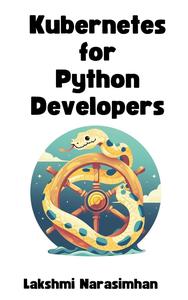
Free Download Kubernetes for Python developers
by Lakshmi Narasimhan P
English | March 21, 2024 | ASIN: B0CXMT7JWB | 440 pages | PDF | 138 Mb
"Kubernetes for Python Developers" is the essential guide for developers new to Kubernetes, focusing on a step-by-step approach from application creation to deployment. Written with beginners in mind, it demystifies Kubernetes through a developer’s lens, ensuring concepts are accessible and practical. The book includes 30+ exercises with solutions and numerous examples to solidify understanding. Whether you’re looking to grasp container orchestration or deploy your Python applications with confidence, this book provides the knowledge and tools needed to navigate the Kubernetes ecosystem effectively.
Contents
1. The meta stuffThe audience of the bookWhy developers should learn KubernetesWhat we will buildWhat prerequisites you need2. Containers recapIntro to containersHow containers workContainer networkingIsolating processesDocker composeDocker registryOther container engines3. Kubernetes 101Why Kubernetes?How Kubernetes worksComponents of a Kubernetes clusterSetting up your first cluster4. Pods 101Kubectl, kubeconfigHow to interact with your clusterPods, eventsworking with pods5. Pods 201Getting inside a podPod probesNamespacesPod networkingDeploying your first application6. Beyond podsReplicasetsDeploymentsServicesFull fledged Flask app with Redis7. Going a notch furtherConfig mapsSecretsInit containersStoring persistent data8. A more robust setupStateful setsService accounts and RBACIngressannotations9. Closing thoughtsSetting up a CD pipeline in GithubGithub actionsWhere to go from hereAppendix A: Troubleshooting common scenariosPod not coming upCorrect labelsExposing portsResource constraintsUnauthorizedAppendix B: Solutions to exercises
Is this the right book for you?
This book aims to bridge the gap between Python development and Kubernetes operations, making it an ideal read for anyone in the software development lifecycle seeking to adopt Kubernetes for Python applications. This includes python developers, beginners to Kubernetes, students and educators.Whom is this book NOT for?
If you already know Kubernetes and are using it in some capacity, then you might not find any value in this book. Also, if you don’t have much of a technical background(don’t know how to work with Python, no idea about containers), then this book won’t be a good fit for you.
About me
I’m a full stack developer with more than 2 decades of experience working with enterprise customers. I’ve been dabbling with Kubernetes since 2018, when there were comparitively lesser resources to tame the Kubernetes beast. I always wanted to read a book to bridge the knowledge gap for a developer who knows a bit of ops and wants to dip their toes in the Kubernetes waters and figured I’ll write one for those who are on the same boat.
Is the book ideal only for Python developers?
IThe book has been written using a Python Flask application as an example. It is quite easy to fit in your Node.js/Java/PHP/Rails/Golang/Rust stack if you understand the concepts explained in the book.
